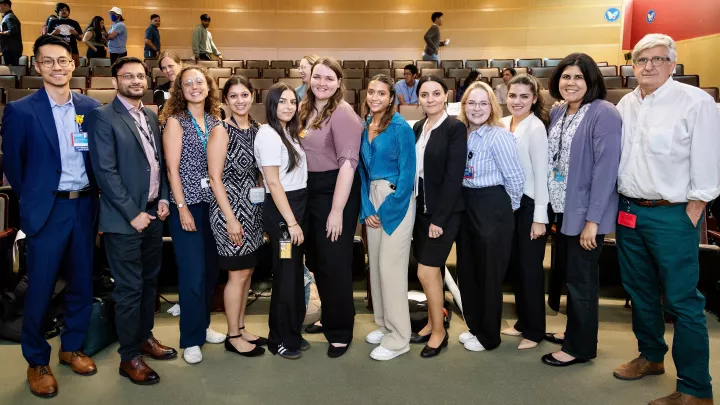
Jessica M. Schwartzman, PhD

Pat Levitt, PhD

Shafali Spurling Jeste, MD
Dr. Shafali Jeste is a behavioral child neurologist specializing in autism and related neurodevelopmental disorders. She is the Chief of the Division of Neurology, Co-Director of the Neurological Institute and the Las Madrinas Chair at CHLA and Professor, Neurology and Pediatrics at the Keck School of Medicine of USC.

Charlotte DiStefano, PhD
Dr. Charlotte DiStefano is a clinical psychologist with expertise in minimally verbal children with ASD and related neurodevelopmental disorders. She is a clinical instructor in Psychiatry and Biobehavioral Sciences.

Rebecca Elias, PhD
Rebecca Elias, PhD (she/her) is a Clinical Assistant Professor of Psychiatry and Pediatrics at Children’s Hospital Los Angeles and USC. Her research focuses on understanding how the fundamental processes associated with Autism Spectrum Disorder (ASD) across the lifespan, influence the response to treatment and adult clinical outcomes. Dr. Elias received her Ph.D. in Clinical Psychology from Virginia Tech where she worked under the mentorship of Dr. Susan White. She completed her postdoctoral fellowship at UCLA in the Department of Psychiatry under the mentorship of Dr. Catherine Lord. She received her predoctoral internship from Indiana University School of Medicine. Prior to her graduate studies, Dr. Elias received her B.A. in Psychology from UC Berkeley. She has participated as a researcher and clinician in several NIH-funded clinical trials and has received independent funding through agencies such as the American Psychological Association.

Marian Castro
Marian Castro is a Health Services and Behavioral Research Associate in the Training and Research to Empower NeuroDiversity (TREND) Lab at Children’s Hospital Los Angeles (CHLA). Marian recently graduated from UC Santa Barbara with a Bachelor of Science in Biopsychology. She has participated in many volunteering and research opportunities that strengthened her passion for clinical psychology. Coming from Venezuela, Marian is interested in studying mental health stigma among Latinx/Hispanic communities, depression and anxiety. Marian’s career goals are to pursue clinical training and advanced research methodologies in clinical psychology, with a focus on studying mental health stigma in diverse communities.

Katia Cardenas Quintero
Katia Cardenas Quintero is a Health Science and Behavioral Research Associate in the Study of autism risk in siblings (StARS) and in the Training and Research to Empower NeuroDiversity (TREND) Lab at Children’s Hospital Los Angeles (CHLA). Katia graduated with a Bachelor of Science in public health from the California State University Fullerton. Katia is passionate about educating and engaging the Latino community in research. Katia career goals are to attend medical school and specialize in pediatric medicine.

Emily Satinsky
Emily Satinsky is a Clinical Psychology PhD student at the University of Southern California. She received her BS in Biology and Society from Cornell University and her MSc in Global Mental Health from King's College London and the London School of Hygiene and Tropical Medicine. She has spent the last several years conducting public health and clinical research in low resource settings in the US and internationally. In her research, Emily focuses on identifying risk and protective factors for mental health (e.g., adverse childhood experiences, social support). She is interested in developing novel peer-delivered and social network interventions that harness positive social and cultural dynamics to increase access to evidence-based mental health care in low resource settings. At the TREND Lab, Emily conducts clinical interviews and assessments with adolescents and their parents.

Santiago Morales, PhD
Dr. Morales works with the TREND lab on EEG methodologies with adolescents to investigate neural markers of reward responsivity and potential associations with depression; he is a mentor on the K23 project.

Katherine Gotham, PhD
Dr. Gotham works closely with the TREND Lab to understand social and identity factors in the pathway to depression in autistic adults; she is a mentor on the K23 project.

Autumn Kujawa, PhD
With the TREND Lab, Dr. Kujawa examines EEG methodologies with autistic youth and potential neural indices of reward responsivity and associations with depression; she is a mentor on the K23 project.

Blythe Corbett, PhD
Dr. Corbett examines pubertal development in autistic youth of both sexes and across ages, with additional research on social competence interventions; she is a mentor on the K23 project.

Alexandra Bettis, PhD
Dr. Bettis works closely with the TREND Lab to engage community partners in improving suicide prevention programs for neurodivergent youth.

Zachary J. Williams, PhD
Dr. Williams collaborates with the TREND Lab to investigate social risk and protective factors for depression in autistic youth and potential intervention approaches.

Matthew Hollocks, PhD
Dr. Hollocks works with the TREND Lab to investigate self-esteem in autistic adolescents and relationships with mental health outcomes and well-being.

Darren Hedley, PhD
Dr. Hedley collaborates with the TREND Lab on several projects examining suicide risk in autistic youth and young adults.

Carly McMorris, PhD
Dr. McMorris works with the TREND Lab on a project examining suicide prevention interventions for autistic youth at risk using community-based participatory research methods, including a grant from the Canadian Institutes of Health Research.

Alexandra Jacobs, BA
Alexandra is an autistic community collaborator of the TREND Lab with interests in improving mental health care and suicide prevention for the autistic community.

Lisa Morgan, LCSW-cc, M.Ed.
Lisa is an autistic community collaborator of the TREND Lab with lived experience of suicide loss and research interests in improving suicide prevention for the autistic community. She is founder and co-chair of the Autism and Suicide Prevention Workgroup, which has developed 5 autism specific resources to support autistic people in crisis and suicide prevention.



